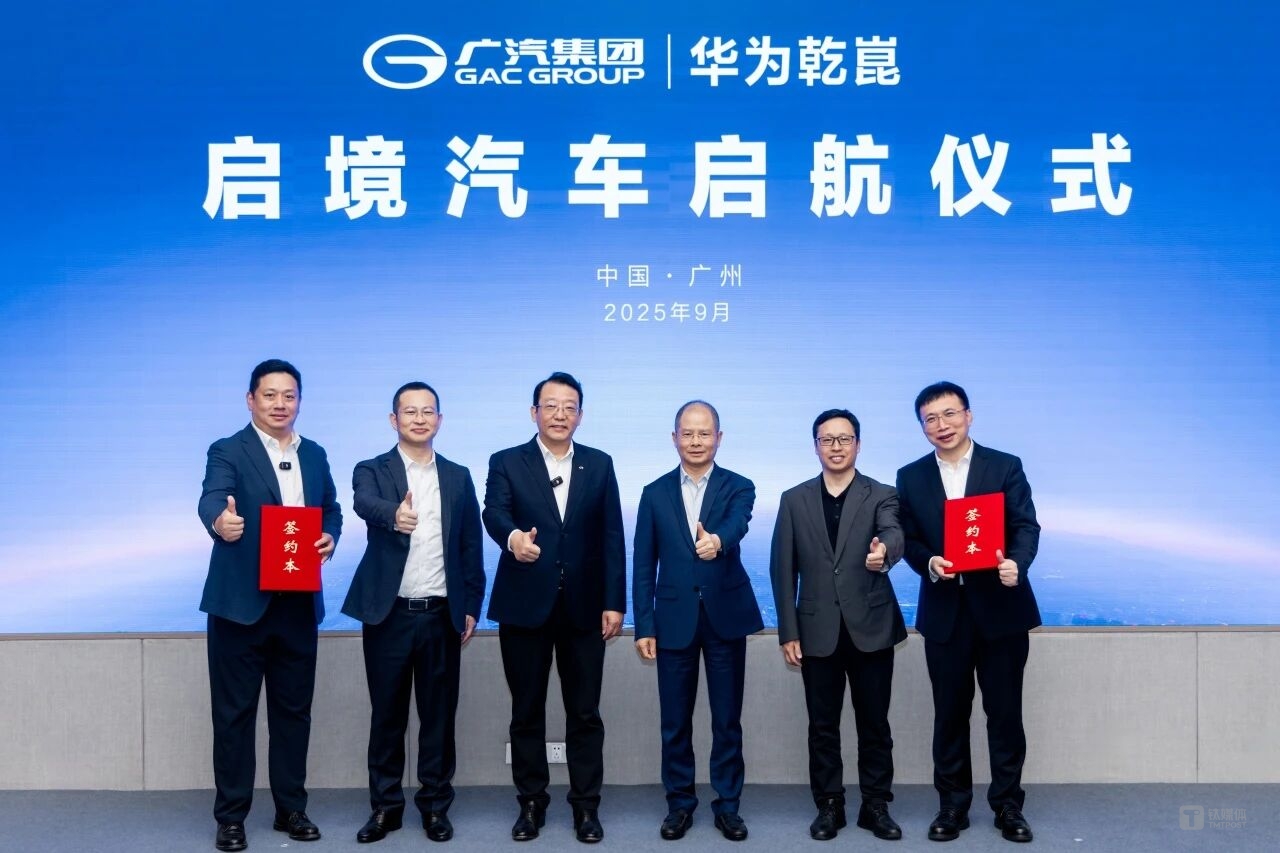
Image source: GAC Group
AsianFin -- After years of a complex, on-and-off partnership, Huawei Technologies Co. and Guangzhou Automobile Group Co. (GAC) are officially joining forces to launch a new premium electric vehicle brand—Qijing.
The name, which translates to “opening a new realm of intelligence,” signals both companies’ ambitions to redefine the high-end smart new energy vehicle (NEV) market.
The Qijing brand will target the 300,000 RMB ($42,500) luxury NEV segment, offering both pure electric and range-extended models, with the first vehicle expected to debut in 2026. Neither company has disclosed precise pricing, emphasizing instead that Qijing represents a joint creation of Huawei Qiankun and GAC, combining Huawei’s intelligence technology with GAC’s electric powertrain and manufacturing expertise.
All Qijing models will incorporate Huawei Qiankun’s most advanced smart vehicle technologies, including assisted driving systems, intelligent cockpit interfaces, and integrated user ecosystems. Beyond hardware, Huawei will also play a lead role in brand marketing—a departure from its prior collaborations under the Harmony Intelligent Mobility framework, which focused primarily on tech integration. This new model—dubbed “HI Plus” by industry insiders—represents what many analysts see as full “Huawei-ization” of the vehicle: Huawei personnel are embedded in every step of development, from product definition to marketing.
Unlike previous partnerships, the Qijing project is led by Huawei Qiankun, giving the tech giant deeper operational control. The brand is independently named rather than following the “Jie” naming convention of Huawei’s Harmony Intelligent Mobility collaborations, signaling its status as a standalone premium brand rather than a co-branded initiative.
The partnership was first hinted at when GAC and Huawei signed a strategic cooperation agreement for smart vehicles last November. After months of exploration, the collaboration model was formalized in June following a visit by GAC Chairman Feng Xingya to Huawei founder Ren Zhengfei. Under the new framework, GAC retains influence over product decisions while fully leveraging Huawei’s technological leadership.
For GAC, the collaboration comes at a critical juncture. The automaker has set a goal of selling 2 million vehicles annually by 2027 and aims to reinvent itself as a “New GAC.” The company has decades of manufacturing experience, including expertise in platform development, battery technology, and quality control, but lagged behind in intelligence systems—a gap Huawei is well-positioned to fill.
The first Qijing model is reportedly in development at a joint office where Huawei engineers work alongside GAC staff, integrating the tech giant’s IPD (Integrated Product Development) and IPMS (Integrated Product Marketing and Sales) systems into the automaker’s operations. This embedded model enables real-time collaboration across design, manufacturing, and marketing, reducing delays and streamlining innovation.
Industry insiders compare the project to Huawei’s partnership with Seres on the AITO brand, which has enjoyed rapid success. AITO delivered over 40,000 vehicles in August alone, with cumulative deliveries exceeding 750,000 units, and posted strong revenue growth and profitability for Seres. In contrast, GAC has faced setbacks in the NEV sector, reporting a 12.5% drop in sales and a net loss of 2.54 billion RMB in the first half of 2025. The collaboration with Huawei is viewed as a strategic move to catch up and reclaim competitiveness.
The market reaction to the Qijing announcement has been muted. GAC’s Hong Kong shares fell 0.59% on the day of the announcement, while its A-shares declined 1.02%. Analysts suggest that investor enthusiasm for automaker-Huawei collaborations has waned, as such partnerships have become increasingly common in China’s crowded NEV market. Skepticism remains over whether Qijing can replicate AITO’s success.
Despite cautious investor sentiment, the Qijing brand has moved quickly in terms of channel expansion. In August, the company launched a “1+N” city recruitment strategy for user centers and experience centers, covering 40 cities including Guangzhou, Shenzhen, Beijing, Shanghai, Chengdu, and Wuhan. Dealer applications reportedly exceeded initial targets by threefold, suggesting strong commercial interest.
Qijing’s long-term strategy emphasizes differentiation and independence. GAC has stressed that the brand will operate separately from its existing Hyper brand, targeting a premium segment with intelligence-driven products and services. The first Qijing models will offer high-end NEV technology, advanced user interfaces, and integrated ecosystems designed to compete with both domestic and international rivals.
The partnership underscores a broader trend in China’s NEV sector, where competition increasingly revolves around intelligence and integration rather than just price or battery range. By combining GAC’s manufacturing know-how with Huawei’s software and AI capabilities, Qijing aims to become a benchmark for premium smart vehicles.

Whether the brand can succeed will depend on consumer reception and delivery performance once the first vehicles hit the market. As GAC and Huawei prepare to launch the Qijing series, the companies hope the combination of technology, manufacturing, and marketing synergy will give them a competitive edge in China’s rapidly evolving NEV market.
更多精彩内容,关注钛媒体微信号(ID:taimeiti),或者下载钛媒体App

